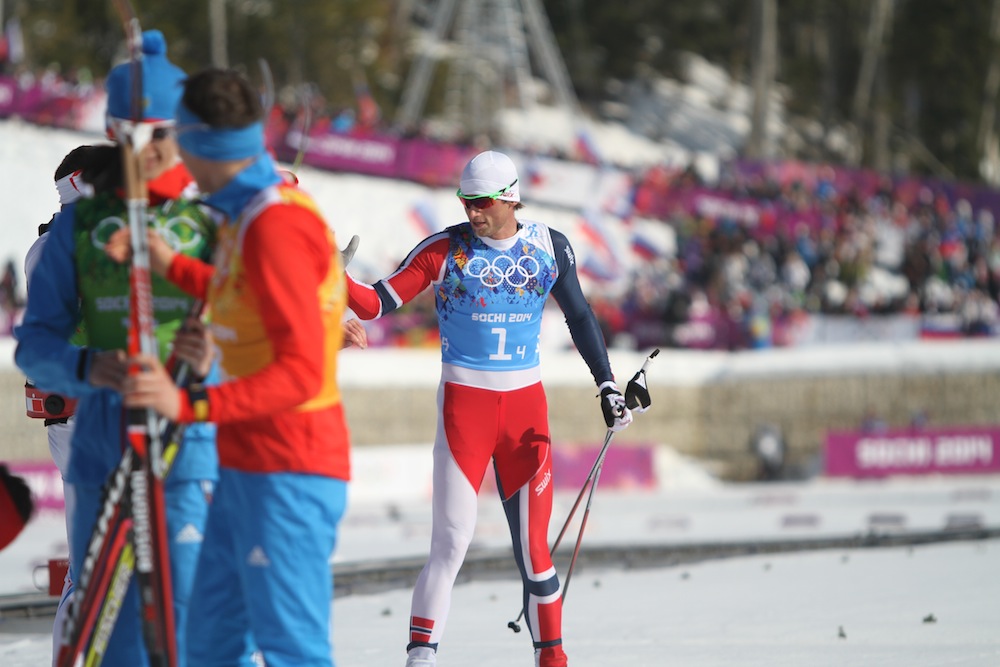
After a car crash in May which left a friend injured, Norwegian ski star Petter Northug has been sentenced to 50 days in jail, among other punishments.
The nine-time World Champion from Strindheim was driving his Audi – a car provided by the company as sponsorship – with elevated blood alcohol levels. Cruising at 83 kilometers per hour in an area where the speed limit was 40, he crashed and totaled the car. Immediately after the crash, Northug fled the scene, leaving his friend in the car.
Today he was convicted of five breaches of traffic law. Drunk driving is an extremely serious offense in Norway.
More importantly, perhaps, he was also convicted of lying to the police. In the first several interviews with law enforcement, Northug claimed that his friend had been driving. Later in the day, he admitted that he had in fact been the driver.
Northug claims that he was still intoxicated the first two times he spoke to police, and suggested that they could have waited until he was sober to interview him, in which case he may never have lied.
Besides the jail time, Northug faces a fine of 185,000 Norwegian kroner, or almost $29,000 U.S.
“I’ve been prepared for this day and known in advance that it was going to be a tough day,” Northug told Norwegian broadcaster NRK, according to a translation. “I’m prepared for any punishment I get.”
It is possible that the sentence may be reduced because he already spent two days in a cell immediately after the accident. Regardless, it is a smaller punishment than was originally proposed by the police, who suggested 60 days in jail, and a heftier fine. Northug’s license was also suspended “permanently”, but he can likely apply to have it reinstated in five years time.
“Not a bad day for Northug, this is – it could have been far worse,” Aftenposten commentator Inge Hansson wrote in an editorial.
However, the decision is still likely to have repercussions for Northug’s ski season. The star underperformed at the Sochi Olympics in February, with a best individual performance of 10th place in the sprint, and contributing to two fourth-place finishes in the relay and team sprint.
As such, he was focusing on the upcoming World Championships in Falun, Sweden, in late February.
“I think about Falun every day,” he told NRK earlier this summer.
The sentence presents two clear obstacles towards this goal. First of all, spending more than six weeks in jail is not ideal endurance training, and given Northug’s occasional struggles with fitness in the past few seasons, this could make it difficult for him to be selected to the very talented Norwegian team.
There may be a possibility for him to serve all or part of his sentence at home, but Northug told the media that he is at the moment not investigating this lead. He is ashamed of his behavior and wants to serve the correct punishment, he claims.
It is also currently unclear whether he must serve the sentence immediately or whether he may defer it until the spring.
Northug told NRK that he does not know how the sentence will affect his chances for World Championships, and that if he misses them, he misses them.
However, many observers have pointed out that Swiss star Dario Cologna – one of Northug’s main competitors – missed almost the entirety of last season with an injury, before competing in one World Cup weekend and then winning gold in Sochi. If Cologna can medal with less than ideal training, it is argued, than Northug should have no problems reaching Falun.
The second conflict comes in whether Norway wishes to be represented by a convicted felon in international competition. In order to compete at World Championships and also any World Cup races, Northug must have a contract with the Norwegian Ski Federation. At the moment, he does not have one.
But the federation said that although Northug’s behavior did not represent the ideals of skiing, it did not violate any of their codes of conduct explicitly since it did not occur in relation to either training or competition. They have offered Northug the chance to sign a contract, and the hang-ups appear to be more related to other aspects of his relationship with the team.
“It is a comprehensive agreement and there are still some unclear points,” Erik Røste, president of the federation, told NRK. “We are in a process in the administration… I note that Peter is in good shape and has done a good training work. There is no question that I hope to see him back in the ski tracks.”
The International Ski Federation says that it has no jurisdiction to ban him from competition.
“Those who have a license will start,” FIS cross-country committee head Vegard Ulvang told Norwegian newspaper VG. “But my task is to set up competitions and schedules, do not consider how kind or unkind people are. So far Northug has an initial license and it is up to the NSF to give him a new start license.”
Northug’s main sponsors, the Coop grocery chain, Red Bull, and Real Estate 1 of Mid-Norway, have stated that the ruling does not change their relationship with the ski star.
Chelsea Little
Chelsea Little is FasterSkier's Editor-At-Large. A former racer at Ford Sayre, Dartmouth College and the Craftsbury Green Racing Project, she is a PhD candidate in aquatic ecology in the @Altermatt_lab at Eawag, the Swiss Federal Institute of Aquatic Science and Technology in Zurich, Switzerland. You can follow her on twitter @ChelskiLittle.




One comment
highstream
October 10, 2014 at 11:44 am
Good for Norway. Unlike America, where every aspect of an athlete’s civilian life is subject to judgment and penalty by athletic organizations and educational institutions, along with unremitting moralistic public exposure, in Norway civil matters are handled by the civil authorities and athletic organizations limit themselves to directly athletic-related matters.